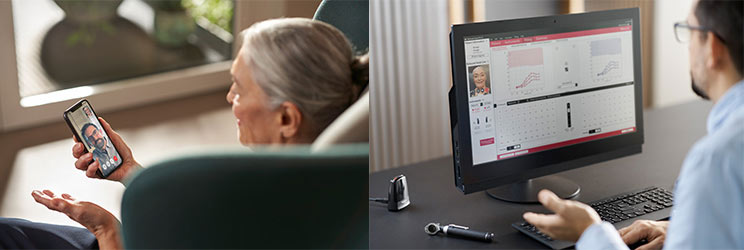Betty Hauck writes on hearatboston@googlegroups.com:
We are happy to welcome Kevin Franck, head of Mass Eye and Ear audiology department who will be speaking about Hearing in the Time of Covid-19 and answering questions. For this virtual meeting the platform will be Google Meet (formerly Hangouts). The big advantage of Google Meet over Zoom is that it has very good captions. Anyone who would like help in getting set up to participate, please email Andrea Kaneb. Andrea is a volunteer and graduate of the HLAA N-CHATT training program, and she is happy to assist you.
First Boston Chapter Virtual Meeting
After a hiatus in chapter meetings because of COVID-19, Sue Schy of the Boston Chapter steering committee got us up and running again with a Zoom meeting on Saturday, April 11, 2020. Thirteen people participated and we each had an opportunity to talk about how we’re coping with the virus, including both positive aspects and challenges. In addition to regular chapter members we welcomed Sandy Spekman who is head of the Plymouth Chapter and Margaret Myatt who is new to our chapter and is looking forward to pitching in and helping us out with her areas of expertise. Regular member Bob Broker who is a tireless volunteer in encouraging senior centers to sponsor hearing loss support groups shared his Gestures in Need aka GinN card to help communicate in hospital settings.
Face Masks and Hearing Aids
One topic that came up was the difficulty of wearing face masks with hearing aids. Masks with ties seem to work better than the elastic ones. Here is a link to additional helpful suggestions:
http://www.chicagonow.com/say-what/2020/04/wearing-a-mask-with-hearing-aids/
Optimal Meetings
Another topic was lighting during Zoom calls. For those of us with hearing loss it is especially important to be able to see each other’s faces so lighting is critical. The best lighting combines a light source in front of your face with overhead lighting. Facing an outdoor light source like a window works well also. Backlighting does not work well because it puts your face in shadow.
For good sound, sit as close as possible to your computer or device’s microphone.
HLAA National: Don’t forget that the National HLAA website is a terrifIc resource for those of us with learning loss, especially now that we’re dealing with Covid-19. Recent past webinars are accessible as well as information about upcoming virtual meetings and the opportunity to sign up. Saturday, April 25th, Gail Hannan will be presenting at 2 pm. www.hearingloss.org
Hearing Loss and Adaptive Skills
I wonder if hearing loss gives us a special advantage in coping with difficult conditions because it is what we do every day?
We hope you and yours are doing as well as can be expected during these trying times and that you will join us for the virtual chapter meeting on May 9th.




 This is from Jonathan Taylor, Vice President of the NYC HLAA Chapter. An abbreviated version
This is from Jonathan Taylor, Vice President of the NYC HLAA Chapter. An abbreviated version